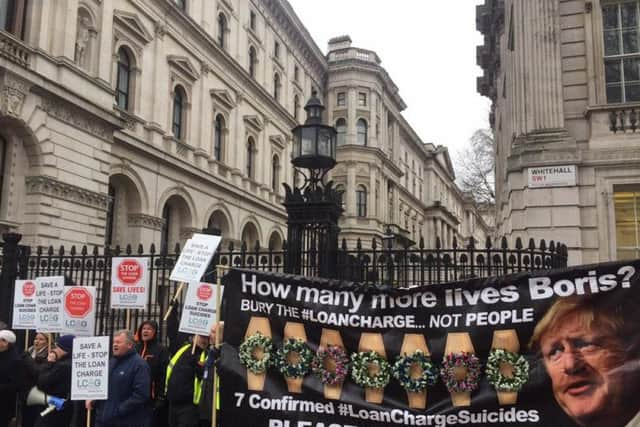'How many more lives Boris?' ask loan charge protesters
Members of the Loan Charge Action Group carried a banner which said “How many more lives Boris?” as they urged the Prime Minister to scrap a controversial policy which critics say breaches the rule of law.
One of the protesters told The Yorkshire Post: “I am by nature a very shy person and get quite stressed at standing in the street, shouting. The overwhelming anger at the situation in which I find myself though, overrides this, and it’s an anger that’s clearly shared amongst the group.”
Advertisement
Hide AdAdvertisement
Hide AdAnother protester said: "It was cathartic to bring the issue to the gates of Downing Street and I felt proud to stand alongside those who I have come to know over the months and years of fighting this.


"With no chance of being able to afford settlement or the loan charge I have no idea what will happen if the loan charge is not stopped."
Another protester said the demonstrations not only helped to get the action group's message across, but also provided the chance to meet other people who have similar problems.
He added: "It's almost like a support group. There are a lot of sad stories out there and coming together and being able to talk to other people who understand is hugely beneficial. I just wish that more politicians would come and talk to us and see that we are just ordinary people who thought we were doing the right thing."
Advertisement
Hide AdAdvertisement
Hide AdAnother protester added: "Despite the rain, wind and train issues, we had a great turnout. People were chanting louder than I have ever heard at any past protest."
"It's still a terrible and unresolved situation, but it was a great protest. As with all the previous protests, I always come away from them feeling hopeful and that I am part of a group, not suffering in isolation."
The loan charge was introduced in response to the Treasury’s concerns about what it described as "disguised remuneration schemes" which involved individuals being paid through loans, usually via an offshore trust in a low or no tax jurisdiction, which they did not have to repay.
Opponents argue that the charge is retrospective and overrides taxpayer protections - claims which have been disputed by the Treasury.
Advertisement
Hide AdAdvertisement
Hide AdWorkers from a wide range of professions have been hit with large tax bills, which in some cases date back to 1999.
Before the election, the All-Party Parliamentary Group on the Loan Charge (APPG) said it had received reports of seven suicides of people who were facing the loan charge.
Before the election was called, the Treasury commissioned an independent review, which is being led by Sir Amyas Morse, to consider the impact of the loan charge.
In a recent interview with Paul Lewis of the BBC’s Moneybox programme, the Chancellor Sajid Javid had indicated that Sir Amyas would submit the review’s findings before Christmas.
Advertisement
Hide AdAdvertisement
Hide AdMPs had previously called for all settlement activity, enforcement and penalties to be suspended pending the outcome of the review and the implementation of the recommendations.
An HMRC spokesperson said recently: "We know that large tax assessments can cause worry and anxiety so we have put in place dedicated resources, including specially trained HMRC officers, to support more vulnerable customers."